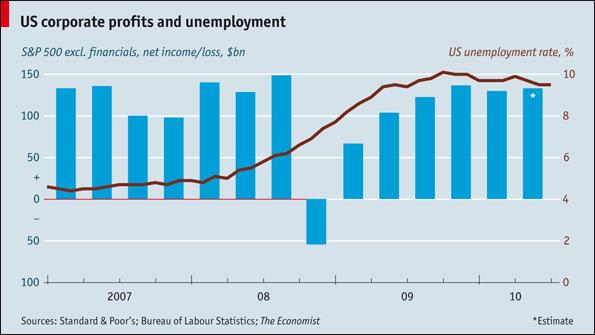つづき
For those wonkishly inclined, Dr Hetzel said their error was to view the enveloping crisis through a "credit" prism, missing the tectonic issue that the "natural rate of interest" had fallen below the Fed funds rate. Failure to diagnose the problem properly meant that Fed policy may have made matters worse. This is perhaps the best analysis I have ever read on what went wrong, yet it has received scant attention.
屁理屈をこねる連中については、「信用」プリズムを透して迫り来る危機を見て、「自然利子率」がFF金利を下回るという構造的問題を見逃したことが彼等の過ちだ、とヘッツェル博士は述べた。
この問題をきちんと診断出来なかったということは、FRBの政策が事態を悪化させたかもしれないということだ。
どうしてこうなった、という考察は様々読んだが、僕はこれがベストの分析だと思う。
でも、ほとんど注目されていない。
Do we have any assurance that central banks have learnt their lesson? Clearly not the ECB, judging from Mr Trichet's ill-judged article for the Financial Times two weeks ago: "Now it is Time for all to Tighten". Much of what he wrote is correct in as far as it goes. Public debt is out of control. Budget stimulus may start to backfire. We are at risk of a "non-linear" rupture should confidence suddenly snap in sovereign states.
中央銀行の皆さんは、教訓をきちんと学んでくれたんでしょうか?
トリシェECB総裁が2週間前にFT紙に寄稿した>『Now it is Time for all to Tighten(今こそ皆引き締める時だ)』なんて頓珍漢な記事から判断するに、ECBは明らかに学んでいない。
トリシェECB総裁が記したことの大部分は、その範囲においては間違っていない。
公共負債は手の付けられないことになっている。
景気刺激はブーメランし始めているかもしれない。
主権国家への信頼が突然失われるようなことがあれば「非線形」破壊に見舞われる危険性がある。
Yet he also suggested that half the world can copy the fiscal purges of Canada and Scandinavia in the 1990s, all at the same time, without setting off a collective downward spiral. He offered no glimmer of recognition that the fiscal squeeze must be offset by ultra-loose money. True to form, the ECB is now draining liquidity. Three-month Euribor has risen to the highest in over a year.
しかしトリシェECB総裁は、世界の半分は、同時に、集団下方スパイラルを引き起こすことなく、カナダとスカンジナビア諸国が1990年代に行った財政再建を繰り返すことは可能だ、とも述べている。
同総裁は、緊縮財政は金融の超緩和政策によってオフセットされなければならない、という認識は一切提示しなかった。
例によって例の如く、ECBは今流動性を失わせつつある。
3ヶ月ものEURIBORは一年以上ぶり最高に上昇した。
John Makin from the American Enterprise Institute described the Trichet argument that collective removal of fiscal thrust can be expansionary as "preposterous and dangerous". Mr Edwards called it "risible".
アメリカン・エンタープライズ研究所(AEI)のジョン・メイキン氏は、財政政策の集団廃止は拡大的となり得るというトリシェECB総裁の主張を、「非常識かつ危険」だと評した。
エドワーズ氏はこれを「笑止千万」とした。
Berkeley's arch-Keynesian Brad DeLong could only weep, saddened that everything learned over 70 years had been tossed aside in a total victory for 1931 liquidationism. "How did we lose the argument," he asked?
バークレー大学の大物ケインズ主義者、ブラッド・デロング教授は、1931年の清算主義が完全勝利を収めるなか、過去70年間に学んだありとあらゆることが紙くずのように放り出されたことを悲しみ、もう泣くしかないのかもしれない。
「どうしてこうなった」と彼は尋ねただろうか。
Unfortunately, such obscurantism is taking hold in the US as well. Alabama Senator Richard Shelby has blocked the appointment of MIT professor Peter Diamond to the Fed Board, ostensibly because he is a labour expert rather than a monetary economist but in reality because he is a dove in the ever-more bitter and polarised dispute over QE.
残念ながら、そのような反啓蒙主義は米国でも進んでいる。
アラバマ州選出のリチャード・シェルビー上院議員は、マサチューセッツ工科大学のピーター・ダイアモンド教授のFRB理事任命を阻止した。
表面上の理由は、教授が金融エコノミストというよりも労働の専門家だからというものだが、本当の理由は、同教授がこれまで以上に冷酷かつ偏向したQE論争ではハト派だからなのだ。
The Senate has delayed confirmation of all three appointees for the board, who all happen to be doves and allies of Fed chairman Ben Bernanke. The Fed is in limbo until mid-September. So the regional hawks who so much misjudged matters in 2008 have unusual voting weight, and now they have a commodity spike as well to rationalise their Calvinist preferences.
上院は理事3名全員の任命確認を遅らせている。
3名とも、たまたまハト派でありベン・バーナンキ議長の同調者なのだ。
FRBは9月中旬まで機能不全だ。
ということで、2008年にあれほどの勘違いをした各地のタカ派が、異例の議決力を有しており、そして今、彼等のカルバン主義の好みを正当化する商品相場の急騰まで起こっている。
Whatever Dr Bernanke wants to do this week - and I suspect he is eyeing the $5 trillion button lovingly - he cannot risk dissent from three Fed chiefs: one yes, two maybe, but not three. He faces a populist revolt from the Tea Party movement, with its adherents in Congress and the commentariat. And China simply hates QE, which may or may not be rational but cannot be ignored.
バーナンキ博士が今週何をしたいと思おうが関係なく(僕は白紙が5兆ドル放出ボタンを愛しそうに眺めているのではないかと思うのだが)、3人のFRBチーフから反対される危険を冒すことは出来ない。
1人ならいいかも知れないし、2人でもなんとかなるかもしれないが、3人はいけない。
バーナンキ議長は、連邦議会と評論家の間で支持を得るティーパーティーから大衆迎合的反乱に遭っている。
また、中国はとにもかくにもQEを憎悪しており、このことは理性に基づくものかもしれないし、無闇に嫌っているのかもいれないが、無視することは出来ない。
Global markets have already priced in the next QE bail-out, banking the "Bernanke Put" as if it were a done deal. We will find out on Tuesday if life is really that simple.
世界の市場は既にQE2を織り込んでおり、まるで約束されたことのように「バーナンキ・プット」を信じている。
人生が本当にシンプルなのかどうか、火曜日にわかるだろう。
 | ダボス会議で聞く 世界がわかる英語(CD付)柴田 真一コスモピアこのアイテムの詳細を見る |










